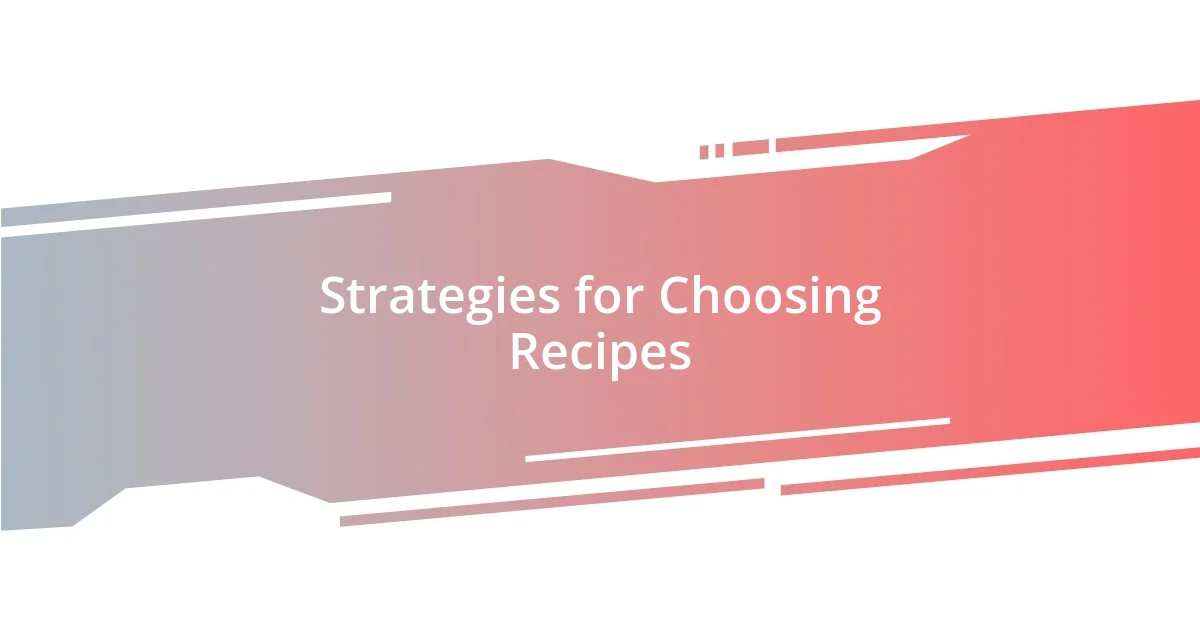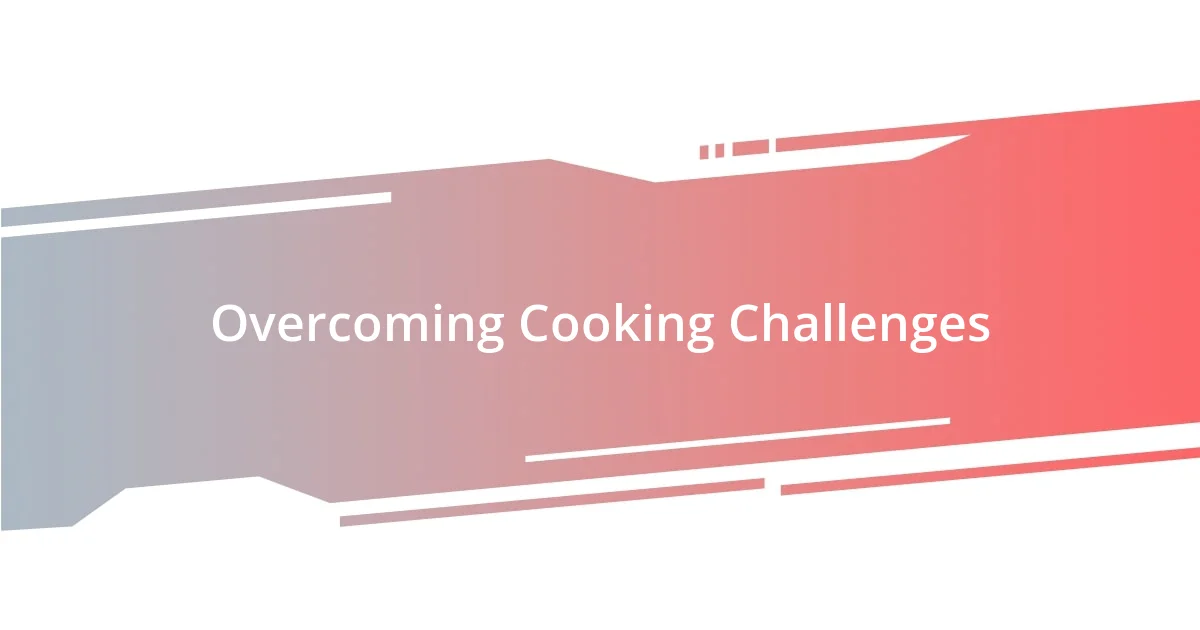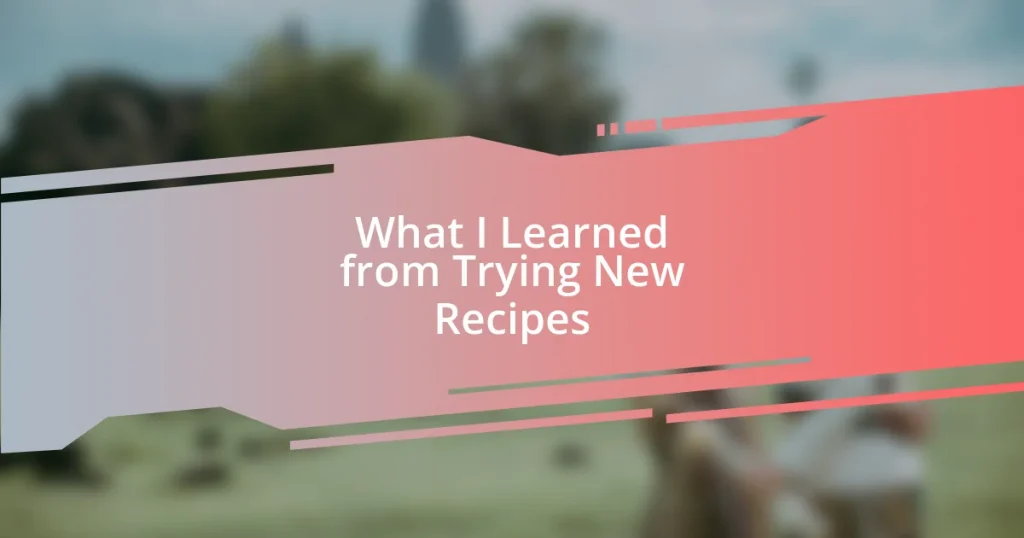Key takeaways:
- Trying new recipes fosters self-discovery, creativity, and resilience by encouraging experimentation and improvisation in the kitchen.
- Cooking at home offers benefits like control over ingredients, strengthening family bonds through collaboration, and a sense of accomplishment with each meal prepared.
- Sharing cooking experiences and gathering feedback enhances skills, provides new ideas, and fosters meaningful connections with others through culinary exploration.

Importance of Trying New Recipes
Trying new recipes is more than just about enjoying a new meal; it’s a gateway to self-discovery. I remember the first time I attempted a complex Thai curry. The vibrant colors and tantalizing aromas ignited a passion in me that I didn’t know existed. Isn’t it amazing how a simple act like cooking can uncover hidden talents or interests?
Experimenting in the kitchen also stretches our culinary boundaries, pushing us to break free from our usual cooking routines. For instance, I once decided to tackle homemade pasta from scratch after watching an Italian chef on a cooking show. It took time and a few flour-covered messes, but the satisfaction of creating something delicious from scratch was unreal. Have you ever felt that exhilarating sense of accomplishment when trying something completely foreign?
Moreover, trying new recipes fosters creativity and fuels our ability to adapt. I recall a time when I didn’t have all the ingredients for a particular dish I wanted to make. Instead of giving up, I improvised with what I had on hand, discovering a new family favorite in the process. Isn’t that the beauty of cooking—taking risks and making it uniquely yours?

Benefits of Cooking at Home
Cooking at home comes with a plethora of benefits that often go unnoticed. First and foremost, it allows us to have full control over the ingredients we use. I remember the first time I made a healthy version of my favorite takeout. I swapped out the heavy sauces for fresh herbs and spices, and the result was even more flavorful than I expected. This control not only promotes healthier eating habits, but it also ensures that what I serve my family aligns with our dietary needs and preferences.
Another significant advantage of home cooking is the opportunity to strengthen family bonds. I recall weekend afternoons spent chopping vegetables with my kids, their laughter filling the kitchen as they eagerly awaited dinner. Those moments of collaboration helped us create not just a meal, but lasting memories together. Cooking can transform into shared experiences, fostering connections that a quick takeout dinner simply cannot.
Lastly, there’s a palpable sense of accomplishment that comes from preparing a meal at home. I can still feel the pride when I successfully baked my first homemade loaf of bread—it filled the house with a warm aroma, and nothing beats that fresh-from-the-oven feeling. That achievement boosts confidence, encouraging us to experiment more in the kitchen, paving the way for further culinary adventures.
| Benefit | Description |
|---|---|
| Control Over Ingredients | Cooking at home allows for healthier choices and customization to dietary restrictions. |
| Strengthening Family Bonds | Sharing cooking experiences enhances relationships and creates cherished memories. |
| Sense of Accomplishment | Successfully preparing a meal boosts confidence and encourages culinary experimentation. |

Strategies for Choosing Recipes
Choosing the right recipes can really make your cooking adventures more fulfilling. I often look for dishes that resonate with my mood or the season. For instance, a cold winter’s night has me reaching for warm, hearty stews, while sunny days call for fresh salads and vibrant salsas. I’ve found that choosing recipes based on my emotions not only makes the cooking experience more enjoyable but the overall meal more satisfying.
Here are some strategies I follow when selecting recipes:
- Assess Your Skill Level: Don’t overwhelm yourself. Start with simpler recipes that help build your confidence in the kitchen.
- Consider Your Ingredients: Look in your pantry or fridge first. Sometimes, the best meals come from what you already have on hand.
- Explore Different Cuisines: I love venturing into cuisines I’ve never tried. It exposes me to new flavors and cooking techniques that keep things exciting.
- Factor in Time and Effort: Be realistic about how much time you have. Sometimes a quick 30-minute dish is just what you need after a long day.
- Read Reviews and Tips: I often go through comments and tips from others who tried the recipe. This helps me avoid pitfalls and gives me extra inspiration.
Another effective strategy I often use is seeking inspiration from cooking shows or food blogs. Watching chefs whip up dishes not only gives me ideas but also encourages me to step out of my comfort zone. I remember feeling an adrenaline rush while attempting a flambé after watching a famous chef do it effortlessly! Sure, it took a few tries and a couple of singed eyebrows, but the thrill of perfecting that technique was unforgettable. Each recipe I choose becomes an opportunity for learning and even a little adventure in my kitchen.

Overcoming Cooking Challenges
Tackling cooking challenges is a journey that offers many valuable lessons. I remember the first time I attempted a soufflé—it fell flat faster than my enthusiasm! That experience taught me the importance of precision. Cooking is not just about throwing ingredients together; it’s a science. Understanding why each step matters can turn a frustrating moment into a learning opportunity.
There’s also something remarkably liberating about making mistakes in the kitchen. I once substituted salt for sugar in a cookie recipe, and the taste was… well, unforgettable in a not-so-great way! Yet, this taught me to pay closer attention to measurements and those little details. When you embrace errors, they become stepping stones toward improved skills, making cooking feel more like a creative expression than a chore.
Additionally, I often find that facing cooking challenges brings out my resilience. One evening, influenced by a cooking show, I decided to whip up homemade pasta from scratch. It was a messy affair, and I almost gave up midway when the dough refused to roll out properly. But pushing through that frustration brought a sense of triumph and made the delicious meal that followed taste that much better. It’s moments like these that remind us: every challenge is an invitation to grow.

Tips for Recipe Modification
When it comes to modifying recipes, I’ve learned to take small steps. For instance, if you want to swap a protein, try using half the recommended amount at first. Once, I replaced chicken with tofu in a stir-fry I adored. The texture and flavor were surprisingly satisfying! It’s all about experimenting to find what works for you, so why not give it a try?
Keep in mind that not all substitutions will yield the same results. I once replaced flour with almond flour in a pancake recipe, hoping for a healthier twist. While the pancakes tasted delicious, they turned out much denser than expected. This experience taught me the significance of understanding the ingredients—some are more forgiving than others. Curious about a new substitution? I encourage you to jot down what you discover along the way!
Lastly, don’t shy away from adjusting flavors to suit your palate. I’ve often found myself adding a pinch of chili flakes or a splash of lemon juice to recipes to give them that extra zing! If the recipe feels a bit bland, trust your instincts and give it a taste test. After all, cooking is an evolving craft—what better way to make it uniquely yours than tailoring it to your favorite flavors? So, what flavors are calling to you today?

Discovering New Ingredients
Exploring new ingredients has been a delightful part of my cooking journey. I remember the first time I stumbled upon sumac in my local grocery store. Its vibrant reddish-purple hue drew me in, and I decided to sprinkle it over roasted vegetables. The tangy lemony flavor it added transformed a mundane dish into something exotic. Have you ever experienced the thrill of discovering a new flavor?
I also love how experimenting with different ingredients can turn a familiar recipe into a new adventure. Once, I replaced traditional potatoes with sweet potatoes in a curry. The warm sweetness provided a wonderful contrast, and I found myself completely enamored with the result. Isn’t it fascinating how a simple swap can create such a different culinary experience?
Diving into unusual ingredients feels like traveling without leaving my kitchen. When I came across black garlic, I knew I had to try it. The complexities of its flavor blew me away—sweet, savory, and slightly tangy. I threw it into a pasta sauce, and the depth it brought was mind-blowing. Have you discovered any unique ingredients that changed your perspective on cooking? I find that embracing these new elements not only enhances my dishes but also ignites my passion for culinary exploration.

Sharing Experiences and Feedback
Sharing my cooking experiences has truly enriched my culinary journey. After trying a new recipe for a Moroccan tagine, I invited friends over to taste the results. Their honest feedback about the dish being too spicy pushed me to rethink my approach. I realized that balancing flavors can be tricky, but it’s the shared moments and opinions that help me grow as a cook. Have you ever had a dish that just didn’t land? Trust me, it’s a common occurrence!
I’ve also found that discussing my culinary experiments on social media opens up a treasure trove of insights. Recently, I posted about a chocolate avocado mousse I whipped up. To my surprise, several followers chimed in with variations of the recipe! One suggestion was to add a hint of espresso, which totally elevated the flavors when I tried it. It made me reflect on how community feedback can transform humble ingredients into something extraordinary. What about you—do you use your social networks to spark recipe discussions?
Sometimes, it’s even the little conversations with family that resonate the most. Last month, while preparing a butternut squash soup, my daughter came in with a brilliant idea: a drizzle of maple syrup for sweetness. Her excited suggestion led to a wonderful bonding moment between us, and the soup turned out delicious! I love how cooking together encourages creativity and makes the experience more than just about food. Have you had similar moments that made your cooking endeavors memorable?















